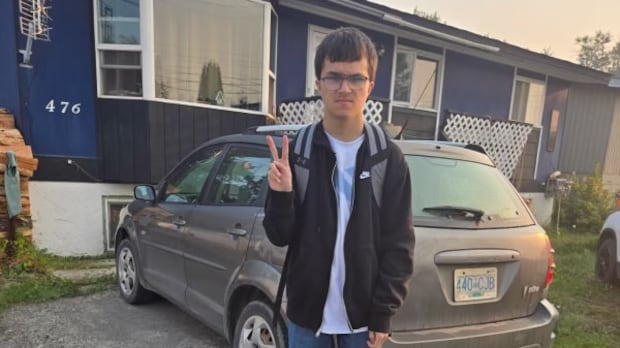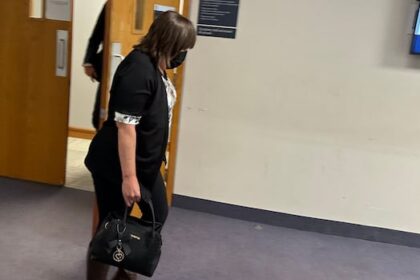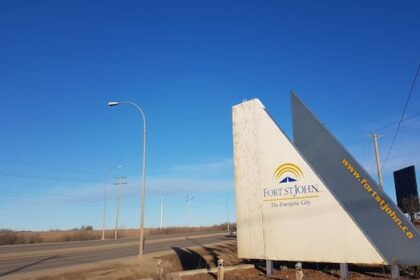British Columbia·NewFifteen-year-old Dominic Juillette, a Grade 10 student at Fort St. James Secondary School, was born with a genetic defect that caused night blindness. But a cutting-edge surgery using retinal gene therapy has allowed him to see the stars.Procedure injects new genes into the eyes of people with Leber congenital amaurosisLauren Vanderdeen · CBC News · Posted: Oct 11, 2025 9:00 AM EDT | Last Updated: 30 minutes agoFifteen-year-old Dominic Juillette has had his night vision restored thanks to a new retinal gene therapy procedure. (Submitted by Vancouver Coastal Health)Just a year ago, 15-year-old Dominic Juillette had to hold on to his grandmother’s shoulder in dimly lit spaces and couldn’t read a menu at a restaurant.Dominic, a Grade 10 honour roll student at Fort St. James Secondary School in Fort St. James, B.C., was born with a genetic defect that causes night blindness.”I would need visual assistance in school and whatnot,” Dominic said.His grandmother, Linda McInnis, said he always went to bed super early.”His attitude was, well, I can’t see anymore, I may as well go to bed. And it’d be, like, 7 o’clock at night.”But since a life-changing surgery with a new retinal gene therapy, Dominic has been able to get out and about at any time of day and be a regular teen.”I now drive an e-scooter around to pretty much everywhere,” he said. “To school, around town. Plus, I also do a lot more things at night.”After two eye surgeries in response to a genetic defect that causes night blindness, Dominic Juillette is now able to ride an e-scooter around town and hang out with his friends late at night. (Submitted by Vancouver Coastal Health)He went to his cousin’s birthday party last week without a hitch.”It was a night party at the beach — I had no problems there,” Dominic said.What was the surgery?Dominic is the second person in B.C. to receive the new retinal gene therapy, according to Vancouver Coastal Health.It’s been performed in provinces across Canada, including Alberta, Ontario and Quebec.The condition Dominic was born with is called Leber congenital amaurosis.It affects around one in every 50,000 people, Vancouver Coastal Health says.”He is not able to produce this specific protein that is important for the vision cycle,” said Dominic’s surgeon, Dr. Wai-Ching Lam, an ophthalmologist and retina specialist at Vancouver General Hospital (VGH).The eye disorder meant that Dominic had difficulty with night-time vision. He also had trouble adjusting to light and focusing.Without treatment, Lam said doctors generally expect the condition to worsen, and it could eventually result in loss of sight altogether.But, Lam said, cutting-edge technology has produced a treatment that was able to stop the process for Dominic and even allow some recovery of the damage.Lam said the delicate part of the surgery involves delivering drops of medication, which are imbued with the new gene, to the back of the eye, underneath the retina.The new gene integrates with the damaged gene, allowing it to produce the protein needed to function properly.A new retinal gene therapy is able to restore night vision loss, according to Vancouver Coastal Health doctors. The surgery delivers drops of medication, which include a new version of a damaged gene in the eye, to a specific place underneath the retina. (Vancouver Coastal Health)The insertion is about the size of a grain of salt, according to Vancouver Coastal Health.Doctors use specialized equipment, including a very high definition microscope to provide real-time imaging of tissue beneath the surface during the procedure, as well as an intraoperative laser scan, to show exactly where the injection is going.’Pretty cool’Lam said he’s hoping Dominic’s story will bring more awareness to Leber congenital amaurosis. Patients need to be identified by genetic testing before the treatment can be offered, he added.Lam also stressed the teamwork of the successful procedure, and noted that First Nations, including the Nak’azdli Whut’en, Carrier, and Sekani First Nations, supported Dominic’s family to travel from Fort St. James to Vancouver to attend health appointments.Since the procedure, Dominic has seen the stars for the first time.”It was actually pretty cool because before that, the night sky just looked blank to me and I can actually see the stars that fell in the night sky.And I see the moon more clearly as well.”ABOUT THE AUTHORLauren Vanderdeen is a web writer for CBC British Columbia. She formerly worked for community newspapers, including the Burnaby Now and New West Record. You can reach her at lauren.vanderdeen@cbc.ca.With files from Jei Zabanal
‘I can actually see the stars’: New surgery restores B.C. teen’s night vision











